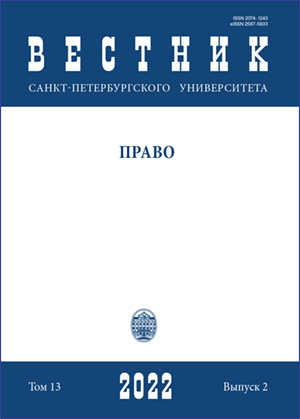Inheritance of social media accounts in Germany and Sweden
DOI:
https://doi.org/10.21638/spbu14.2022.210Abstract
The question how the legal framework may cover Internet relations is not new and has been discussed at least since the end of the 20th century. But over the past decade and a half, the electronic environment has been developing, while classification and regulation of new institutions raise some complexities. One of them is social media accounts. Their legal status as objects of rights is unclear since such accounts are a set of rights and relationships laying at the intersection of different institutions and law branches such as contractual relationships, copyright for posts and photos, personal correspondence, and privacy. At the same time, commercialization of social media accounts is gaining momentum, which turns them into an “electronic enterprise”. The purpose of this research is to identify order of inheritance of accounts in Sweden and Germany. These legal systems are close to the Russian one, the results obtained may be used to improve Russian legislation. Moreover, the authors know the relevant foreign languages, which allows them to analyze the legislation in detail. The object of analysis is the relationships that arise in connection with the need to determine the legal fate of a user’s account after his death. The scope of inheritance relations is chosen because this issue has become increasingly common in law enforcement practice. Besides, the Federal Supreme court of Germany recently issued a controversial decision which might affect German law, other European legal systems, or the relevant elements of the content of user agreements. The authors use the comparative method, methods of analysis, synthesis, deduction, and induction. The authors’ conclusion is the issue is unsettled. The solution proposed by the German Federal Supreme court is imperfect. In the article there are also some comments on improving Russian regulation, taking into account the experience of the legal systems studied.
Keywords:
digital property, digital accounts qualification, digital accounts inheritance, inheritance digitalization, memory clause
Downloads
References
Downloads
Published
How to Cite
Issue
Section
License
Articles of "Vestnik of Saint Petersburg University. Law" are open access distributed under the terms of the License Agreement with Saint Petersburg State University, which permits to the authors unrestricted distribution and self-archiving free of charge.







